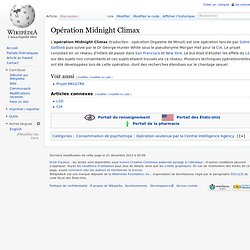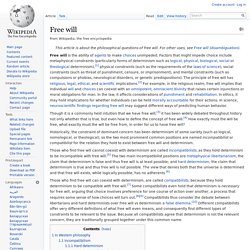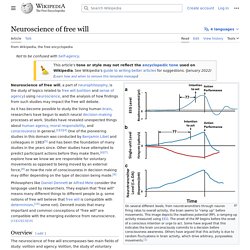

Opération Midnight Climax. Un article de Wikipédia, l'encyclopédie libre.

L’opération Midnight Climax (traduction : opération Orgasme de Minuit) est une opération lancée par Sidney Gottlieb puis suivie par le Dr George Hunter White sous le pseudonyme Morgan Hall pour la CIA. Le projet consistait en un réseau d’hôtels de passe dans San Francisco et New York. Le but était d’étudier les effets du LSD sur des sujets non consentants et ces sujets étaient trouvés via ce réseau. Plusieurs techniques opérationnelles ont été développées lors de cette opération, dont des recherches étendues sur le chantage sexuel. Projet MKULTRA Articles connexes[modifier | modifier le code] Fast Company. Wired 13.03: Mind Control. Matt Nagle is paralyzed.

He's also a pioneer in the new science of brain implants. By Richard MartinPage 1 of 4 next » Matthew Nagle is beating me at Pong. "O, baby," he mutters. The creases in his forehead deepen as he moves the onscreen paddle to block the ball. Story Tools Story Images Click thumbnails for full-size image: The remarkable thing about Nagle is not that he plays skillfully; it's that he can play at all. A bundle of wires as thick as a coaxial cable runs from a connector in Nagle's scalp to a refrigerator-sized cart of electronic gear. Nagle, 25, is the first patient in a controversial clinical trial that seeks to prove brain-computer interfaces can return function to people paralyzed by injury or disease. After we play Pong for a while, I ask Nagle to try something I'd seen him do in a video: draw a circle.
Today, Nagle barely gets to imperfect. "I'm tryin', dude," Nagle says, cursing softly. Roughly the size of a deflated volleyball, your brain weighs about 3 pounds.
Finite_budget. Security. Satellites; measurement tools. Estimated value of a living being. Finite value of a living being. Infinite value for each living being. Dissociation animals/humans/insects/minerals/vegetals. Free will. Though it is a commonly held intuition that we have free will,[3] it has been widely debated throughout history not only whether that is true, but even how to define the concept of free will.[4] How exactly must the will be free, what exactly must the will be free from, in order for us to have free will?

Historically, the constraint of dominant concern has been determinism of some variety (such as logical, nomological, or theological), so the two most prominent common positions are named incompatibilist or compatibilist for the relation they hold to exist between free will and determinism. In Western philosophy[edit] The underlying issue is: Do we have some control over our actions, and if so, what sort of control, and to what extent? These questions predate the early Greek stoics (for example, Chrysippus), and some modern philosophers lament the lack of progress over all these millennia.[11][12] Below are the classic arguments bearing upon the dilemma and its underpinnings.
[edit] Notes. Neuroscience of free will. Neuroscience of free will is the part of neurophilosophy that studies the interconnections between free will and neuroscience.

As it has become possible to study the living brain, researchers have begun to watch decision making processes at work. Findings could carry implications for our sense of agency and for moral responsibility and the role of consciousness in general.[1][2][3] Relevant findings include the pioneering study by Benjamin Libet and its subsequent redesigns; these studies were able to detect activity related to a decision to move, and the activity appears to begin briefly before people become conscious of it.[4] Other studies try to predict activity before overt action occurs.[5] Taken together, these various findings show that at least some actions - like moving a finger - are initiated unconsciously at first, and enter consciousness afterward.[6] A monk meditates.
Overview[edit] -Patrick Haggard[6] discussing an in-depth experiment by Itzhak Fried[13] Criticisms[edit]